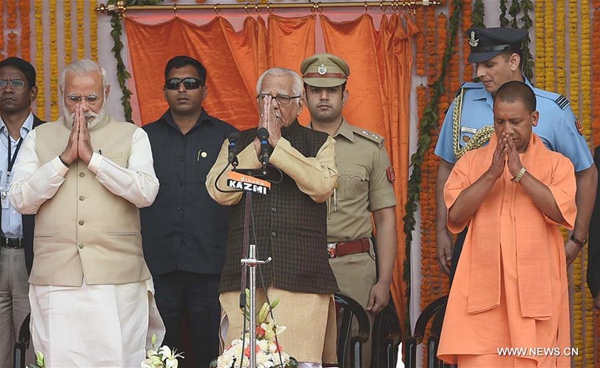Modi's elections victory sets India's future direction
- By Niranjan Sahoo
 0 Comment(s)
0 Comment(s) Print
Print E-mail China.org.cn, March 23, 2017
E-mail China.org.cn, March 23, 2017
|
|
|
Indian Prime Minister Narendra Modi (L front), Governor of Uttar Pradesh Ram Naik (C front) and newly appointed Chief Minister of Uttar Pradesh Yogi Adityanath (R front) greet the crowd during Yogi Adityanath's swearing-in ceremony in Lucknow, capital of northern Indian state of Uttar Pradesh on March 19, 2017. Yogi Adityanath, a controversial Hindu saint and a five-time parliamentarian of the country's ruling Bharatiya Janata Party (BJP), was on Sunday sworn in as the Chief Minister of India's most populous and politically important state of Uttar Pradesh. (Xinhua/Stringer) |
The recently concluded state level elections in India saw the ruling coalition led by Narendra Modi's Bharatiya Janata Party (BJP) achieving landslide victories in the key states of Uttar Pradesh and Uttarakhand, and being able to form governments in four out of five states that went to the polls.
The big catch was taking more than 80 percent of the seats in Uttar Pradesh (UP), India's largest and politically most powerful state. With a population bigger than Brazil, UP alone sends a mammoth 80 members (out of total 530 seats) to the Lok Sabha (Lower House of Parliament).
What is even important is that this one state has provided eight of the country's 14 prime ministers. In fact, BJP's landslide in the 2014 General Election was mainly the result of its overwhelming victory in UP, where the alliance claimed 73 seats out of 80 constituencies.
While BJP's overall tally looks frightening for the rival political parties, such electoral sweeps are the result of hard work, careful strategy, superior mobilization skills, innovative campaigns, and, this time, Modi's charismatic leadership.
He spent a significant chunk of time campaigning in state elections, something unusual for a serving prime minister, proving his critics wrong by pulling a surprise victory from the jaws of defeat in India's largest state.
Despite many unmet promises including creation of a million jobs every month and the controversial demonetization drive that suddenly rendered a massive 86 percent of currency illegal, Modi crafted a brilliant campaign showing remarkable inventiveness and was able to break through the barriers of caste, class and religion long bedevilling Indian politics.
For a long time, Indian voters never had such unswerving faith in a serving prime minister who continues to carry the confidence and public trust even in the mid-year of his first term in office.
While these are mere state elections, and a general election is still far off in 2019, yet such a decisive verdict, endorsing the prime minister and his policies, has a bearing on many fronts.
First, these elections can be seen as a semi-final for the BJP-led coalition and according to many analysts this should ensure Modi easily retains power in 2019. Second, the state-level verdicts will surely encourage him to opt for bolder and more unconventional economic policies.
Given his party won a landslide against a background of demonetization, a highly disruptive economic policy that caused great inconvenience to the vast majority of population for several months, suggests the government might now take decisive steps in critical policy areas such as land, labor and infrastructure building.
This is because the state-level victories will help the ruling coalition in terms of improving its tally in the Rajya Sabha (Upper House). Despite having absolute majority in the Lok Sabha in 2014, BJP's continued lack of majority in the upper chamber has forced it to postpone many crucial pieces of legislations in the areas just mentioned.
Third, the results will list the spirits of the markets as it boosts India's political appeal among international investors. At a time when most large economies in the world are going through turmoil and uncertainty, India's appeal as major economy has improved dramatically. If the booming stock market is an indicator, the upward movement has already begun.
Finally, we can expect greater activities in India's external dealings. Modi who has energized India's foreign relations through his multilateral meetings and frequent bilateral visits covering 56 countries in a span of two-and-a-half years will become a much more confident leader now.
International respect is important domestically. Much of his pet economic and infrastructure projects such as "Made in India" rest on assured foreign investment, accessing high end technologies and above all in ensuring peace and stability in the immediate and extended neighborhood.
As a realist and pragmatic leader evident from his masterly ability to maintain a cordial relationship with China and Japan at the same time, the mid-term mandate allows him to break the shackles of provincial pressures in his external engagements. With most regional parties cut down to size, one can expect Modi to opt for more ambitious and decisive direction in India's shaky foreign policy.
Niranjan Sahoo is Senior Fellow, Observer Research Foundation, New Delhi
Opinion articles reflect the views of their authors, not necessarily those of China.org.cn.







Go to Forum >>0 Comment(s)